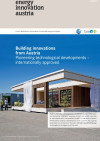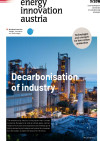Suchergebnisse für "Factsheet: Energietechnologien gestalten, die für alle sinnvoll und nutzbar sind"
Information-point for renewable and environmental/ecological materials

An internet platform with full information and detailed data about building materials made of renewable resources, which serves as the central information-point for different stake holders - from private house builders over architects and master-builders to experts in the field of building laws and regulations.
VITALITY - Energy optimised design rules and integral planning approach for building-integrated photovoltaics in urban areas
The VITALITY project aims to provide supporting tools, design rules and robust information in the early decision and design phase of building projects. By providing the right information at the right time, building-integrated photovoltaics (BIPV) is part of the discussion in the concept phase and the implementation is strongly prepared and supported.
Digital Submission - Preparation of planning and decision-making processes, digitisation of building permit procedures (D-SUB)
The aim of this project was to develop and evaluate the foundation for the implementation of digital processes for building permit procedures in Styria. The project started with the recording, processing, and validation of the actual processes of building permit procedures of the city of Graz and the municipality of Stainach-Pürgg.
Gründerzeit with future - subproject 4: Development of a real estate portfolio management tool for real estate trustees and owners
Development of a portfolio management tool for the administration of real estate technical data and to support the decision-finding process related to renovation of "Gründerzeit" buildings. The management tool will be applied in practice, in the demonstration projects implemented within the flagship project "Innovative Modernisation of Wilhelminian style "Gründerzeit" Buildings". The results will be available in the form of check-lists and guidelines applicable in the decision-finding process related to renovation measures.
Evaluation of visionary architectural concepts
The aim of this project is to show that even at first glance unrealistic and seemingly unworkable solutions can contribute to overcome or mitigate increasingly global problems. The keywords "smart city", "smart home" (and similar ones) require solutions that are envisioned on free roads, as off-the-shelf solution often do not deliver the required output.
SmallWindPower@Home - Impact assessment of building-mounted small wind turbines on performance, people, building and environment
Within the project SmallWindPower@Home the impact of complex obstacles on the local flow pattern as well as on the inflow and the performance of different building-mounted small wind turbines (SWT) had been evaluated. Furthermore the effects of these building-mounted SWT on the building, the resident people and the direct environment were analysed.
"Leitbilder" in "energy regions" or how to co-ordinate technical change
In three Austrian regions, which call themselves "energy regions", the processes leading to the formulation of common visions or "leitbilder" is analysed and the impact is assessed such "leitbilder" can have on technical change on the regional scale. On this basis and with help of external consulters adapted communication and network strategies are developed and examined with regard to transferable elements.
Information point for renewable and ecological materials (II) online information plus service offer

Development and maintainance of the internet platform for building materials made of renewable resources at www.nawaro.com, which serves the central information-point for important stake holders - private house builders, architects, master-builders and experts in the field of building laws.
SPIDER - Subtraction as a measure to Preserve and Insulate historic Developments by Electric Robots
The purpose of this exploration is to unlock the potential of autonomous, data-driven robots that achieve improvements of the thermal building performance through air entrapments in a continuous process.
Building innovations from Austria

Pioneering technological developments – internationally approved
energy innovation austria
1/2017
Herausgeber: BMVIT und Klima- und Energiefonds
Englisch, 8 Seiten
Downloads zur Publikation
IEA PVPS Task 13: Reliability and Performance of Photovoltaic Systems (Work Plan 2024 - 2025)
IEA PVPS Task 13 engages in focusing the international collaboration in improving the reliability of photovoltaic systems and subsystems by collecting, analyzing and disseminating information on their technical performance and durability, providing a basis for their technical assessment, and developing practical recommendations for improving their electrical and economic output in different climatic regions.
Sustainable quarter "Aspern"
The development concept for the new quarter in Vienna (a former airfield) demands a great deal of sustainability: overall energy strategy, sustainability criteria as financial incentives for applicants for building permits and construction of sustainable and energy efficient buildings.
Decarbonisation of industry

Ways to achieve a zero-emission industry. Innovation is the key for climate-friendly production.
energy innovation austria
3/2019
Herausgeber: BMVIT und Klima- und Energiefonds
Englisch, 12 Seiten
Downloads zur Publikation
City of Tomorrow
City of Tomorrow puts emphasis on the built infrastructure in connection with urban energy systems, both on a district-level and within the wider agglomeration (suburban areas).
Best-of "Building of Tomorrow" 2010
22. and 23. November 2010
Skylounge, Austrian Chamber of Commerce (WKO)
Vienna, AT
In the frame of this conference results and ongoing activities of the research programme "Building of Tomorrow" are going to be presented.
VR4UrbanDev - Virtual Reality as an innovative, digital tool for the integrative urban development of the future
Virtual reality (VR) has the potential to make complex issues more quickly comprehensible and directly tangible. In the VR4UrbanDev project, we are using this potential for energy planning processes for buildings and urban districts. On the basis of test areas, we develop methods for importing and visualising energy-related real-time data and simulation data in the VR environment.
Sustainability Management System - scorecard-based construction of an operative sustainability management
Implementation of a scorecard-based sustainability management system in four enterprises; adaptation of a web-based software for sustainability management and reporting; preparation of the manual "Sustainability Managing Systems" on the basis of the OIN guidelines "Reporting about Sustainability".
StromBIZ - demonstration projects: business models for decentralized electricity generation and distribution
Feasible business models to utilize locally generated renewable energy are expected to induce a tipping point for the "Energy Turnaround" in Austria. Within the proposed project a number of demonstration PV plants on residential and non-residential buildings had been realized. On this basis new approaches of business cases had been developed, implemented, tested and disseminated.
IEA ES Task 43: Storage for renewables and flexibility through standardized use of building mass
Thermal building mass activation uses building masses to condition interior spaces, but can also function as energy storage through targeted overheating/undercooling. This storage potential can be used for local and grid-connected renewable thermal and electrical energy (Power2Heat). The project develops new content on the construction, control and business models of such storages and disseminates it as guidelines, data and on the basis of best-practice objects that have been implemented.
IEA AFC Annex 35: Fuel cells for portable applications (Working period 2017 - 2019)
The aim of Annex 35 is the information exchange on the status and new developments of portable fuel cell systems and comprises the development and manufacture of membrane electrode assemblies (MEAs) all the way through to system components such as electronic converters or gas supply units. In addition the setup and configuration of hybridized systems and the key topics of secure operation, codes and standards are of interest.
